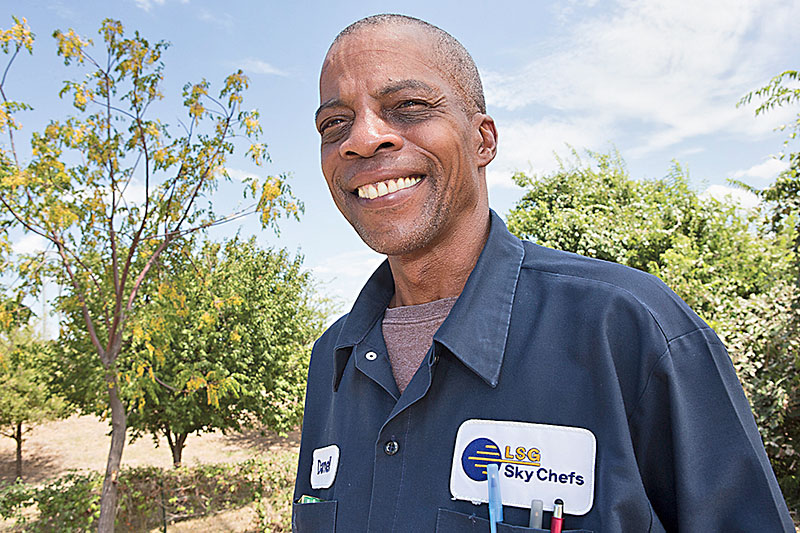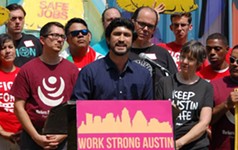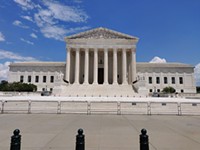Sick Leave in Limbo
The waiting room
By Mary Tuma, Fri., Aug. 31, 2018

This year was the roughest for Keith Franklin, who's battling stage 4 cancer. Same may go for his brother and roommate Darnell, who works at the airport, and had to use his three allotted paid sick days and all of his accrued vacation shuttling Keith to doctors' appointments and hospital visits. And when Darnell caught the flu in May and spent two weeks at home, he lost the wages he would have earned. "I can barely manage to make rent now, so when I miss just one day it really hurts," he said.
Darnell's lack of available time off makes it difficult to care for his brother, so he'd been looking forward to Oct. 1, when the city's new paid sick leave ordinance was set to take effect. The ordinance requires businesses with more than 15 employees to provide up to eight days of paid sick leave, and smaller businesses to provide up to six. (The ordinance also applies to taking time out for legal action related to domestic abuse, sexual assault, or stalking, and taking care of sick family.) But that plan has been stalled for Darnell and the estimated 211,000 locals who could benefit. On Aug. 17, the state's 3rd Court of Appeals temporarily blocked it from taking effect, granting the wishes of Attorney General Ken Paxton and business groups, represented by right-wing think tank the Texas Public Policy Foundation. This after Travis County Judge Tim Sulak denied TPPF's request to block the rule in June. While the 3rd Court issued no opinion on whether the rule is legal, it did agree that the ordinance should be temporarily halted, leaving its future murky.
Labor and employment attorney Melissa Ackie has been tracking the suit, and said the law "could be tied up in litigation for some time." Since final court briefs are due on Sept. 21 and oral arguments must be scheduled after that, it's unlikely the court will act before the ordinance is set to take effect. And even if the city is successful, challengers could appeal to the Texas Supreme Court and request similar relief, further delaying its implementation.
The delay is doubly frustrating for labor advocates who consider the state and TPPF's argument misguided: The claim is that the ordinance pre-empts the Texas Minimum Wage Act because it would increase wages beyond those permitted by state law. Texas AFL-CIO spokesperson Ed Sills says the state may "pretend" not to understand the "obvious differences" between wages and an earned option to take time off if someone is sick, but they are not the same. "It just doesn't work like that," he said. "There's a difference between wages and a benefit – and this is clearly a benefit, and a contingent one at that."
The other leading myth is that the ordinance will hurt businesses' bottom lines. But while there may be a cost to implementing the ordinance, the benefits could be greater. Austin private-sector employers are expected to save nearly $39 million, mostly due to reduced turnover. (Lowering "presenteeism" – or working less productively while sick – totals about $2.8 million, and savings from reduced spread of flu within workplaces are about $1.5 million.) When workers aren't showing up sick to work, the community benefits, too: It's projected that Austin will spend $3.8 million less annually on health care expenses largely as a result of reduced short-term nursing home stays and emergency department use.
Moreover, says Sills, opposing this type of ordinance amounts to "showing contempt" for your employees. "We're not talking about making someone rich here. We're talking about setting things up so an employee doesn't have to make the horrible choice between going to work sick or going to the doctor." Amanda May, owner of eco-cleaning business Purple Fig, calls paid sick leave a no-brainer. She's instituted such a policy for her employees for the past seven years. "These people are working hard for me so I feel like my job is to support them, and this is one way to do that," she said. "It's a symbiotic relationship and in the end, makes my business stronger and benefits the whole community."
The future of paid sick leave is being made more opaque by Republican legislators – including local Rep. Paul Workman – who've vowed to file legislation to stymie the rule next session. In the eyes of ordinance sponsor Greg Casar, that effort indicates that the state is acting hypocritically. "If they believe the ordinance is already in conflict with state law, why would they need to file a bill and create a law to override the ordinance?" he asks.
For Casar, the fight against paid sick leave isn't just about the business lobby working hand-in-hand with Paxton. It's also part of the conservative strategy to nullify gains won by progressives. The effort for paid sick leave started a year ago this Labor Day, as a coalition of groups including the Workers Defense Project and UNITE HERE, dubbed Work Strong Austin, spurred statewide interest that resulted in a broader coalition called Working Texans for Paid Sick Time. Earlier this month, San Antonio passed its own paid sick leave ordinance.
But where there's a successful local progressive campaign, count on TPPF and the state of Texas to be rallying against it. They're stringently against the $925 million city bond – which includes historic investment in affordable housing – as well as Austin's fair chance hiring ordinance, and they celebrated the Texas Supreme Court's decision to overturn the plastic bag ban.
"I don't think it's just about stamping out local control – I think it's about oppression of local progressive movements that have shown to be successful," says Casar. "What [the state and TPPF] may find more intolerable than workers' rights is the local activists' power bubbling up and winning real victories."
Got something to say on the subject? Send a letter to the editor.










